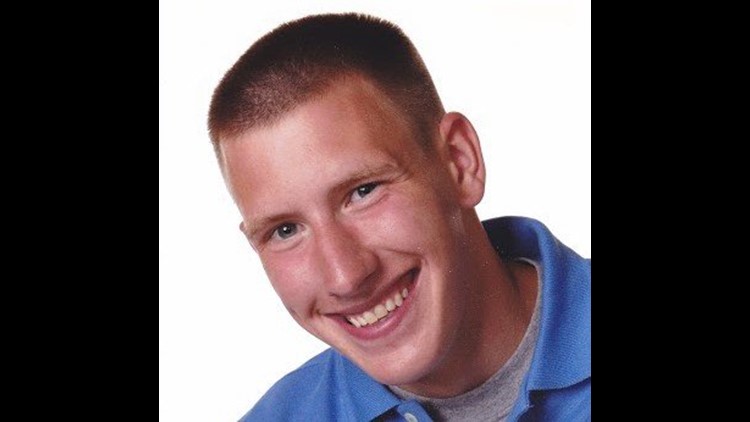(CNN) — The parents of Peter Kassig spoke to reporters Monday, asking for prayers and privacy.
“Our hearts are battered, but they will mend. The world is broken, but it will be healed in the end. And good will prevail as the one God of many names will prevail,” Paula Kassig said at a church in Indianapolis.
Kassig, 26, grew up in that city, the only son of Paula and Ed Kassig. A video released over the weekend appears to show the aftermath of his beheading, at the hands of ISIS.
He was captured in 2013 while on his way to Deir Ezzor, Syria. While in captivity, he converted to Islam and took the name Abdul-Rahman Kassig.
“Please pray for Abdul-Rahman, or Pete if that’s how you know him, at sunset this evening,” Ed Kassig said.
“Pray also for all people in Syria, in Iraq, and around the world that are held against their will. And lastly, please allow our small family the time and privacy to mourn, cry — and yes, forgive — and begin to heal,” he said.
Peter Kassig joined the U.S. Army in 2006. He became part of the elite 75th Ranger Battalion and deployed to Iraq in 2007.
He served only a brief tour. He was honorably discharged for medical reasons and returned to the United States to study political science at Butler University.
He also married and quickly divorced. And he felt stirrings of a higher calling even then.
“I was going to school with kids who look the same, were the same age as me, but we weren’t the same,” he told CNN’s Arwa Damon in a 2012 interview. “I wanted more of a challenge, a sense of purpose.”
After receiving training in emergency medical skills, Kassig returned to the Middle East — this time as an aid worker.
He later formed a nonprofit, Special Emergency Response and Assistance, to deliver humanitarian aid to Syrians affected by the fighting there.
“I am not a doctor. I am not a nurse,” he said in the 2012 interview. “But I am a guy who can clean up bandages, help clean up patients, swap out bandages, help run IVs, make people’s quality of life a little bit better. This is something for me that has meaning, that has purpose.”
Before his capture, he was not unaware of the dangers of what he was doing, but said his work was crucially important.
“There’s this impression, this belief that there is no hope. That’s when it’s more important than ever, against all odds, to try to do something.”
In a letter to his parents, he wrote: “If I do die, I figure that at least you and I can seek refuge and comfort in knowing that I went out as a result of trying to alleviate suffering and helping those in need.”
Margaret Brabant, a professor who served as Kassig’s academic counselor during his time at Butler, said all those who knew him are in mourning, but that even in death, her former student can serve others.
“I hope that our students will learn from this individual, and that he tried to give back to the world and that he cared very deeply and loved the world he was in,” she said.
On Sunday, President Barack Obama praised the “selfless acts of an individual who cared deeply about the plight of the Syrian people.”
“Today we grieve together, yet we also recall that the indomitable spirit of goodness and perseverance that burned so brightly in Abdul-Rahman Kassig, and which binds humanity together, ultimately is the light that will prevail over the darkness of ISIL,” Obama said.
The U.S. government is conducting a review of how it responds when American citizens are taken hostage by overseas terrorists, including how the families of captives are kept informed, CNN learned Monday.
A top Pentagon official wrote in a letter to Rep. Duncan Hunter, R-California, that President Obama had ordered a “comprehensive review of the U.S. Government policy on overseas terrorist-related hostage cases, with specific emphasis on examining family engagement, intelligence collection and diplomatic engagement policies.”
Duncan has advocated for a tougher U.S. response when Americans are taken captive overseas. The Obama administration response was first reported Monday by The Daily Beast.
The Pentagon official who wrote Duncan, Under Secretary of Defense Christine Wormuth, said the review came as a result of “the increased frequency of hostage-taking of Americans overseas” and would seek to add “innovative and non-traditional solutions” to hostage-recovery efforts.
On Sunday, Islamic State terrorists released the fifth video showing the brutal execution of a Westerner, in this case, American aid worker Peter Kassig. Two other Americans have been shown in previous videos being beheaded by ISIS: James Foley and Steven Sotloff, both journalists.
After Foley’s death in August, the United States said it had attempted to rescue him and other hostages in a military operation over the summer but couldn’t find where they were being held.
Foley’s mother later told CNN she was “embarrassed and appalled” by how the U.S. government had responded to her son’s case.
“I think our efforts to get Jim freed were an annoyance” to the U.S. government, Diane Foley said on CNN in the weeks following James Foley’s death. She said the U.S. government should be more willing to negotiate with ISIS in order to free hostages.
Other governments, particularly in Europe, have successfully won the release of captives by paying ransoms to ISIS. Obama and other U.S. officials have decried the practice, saying the money has fueled the group’s rise.
The National Security Council did not immediately respond to a request for comment on the



